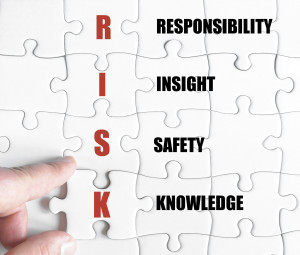WHY RISK MANAGEMENT IS IMPORTANT TO YOU
Risk Management is a process that enables you to cope with uncertainty by taking proactive measures to protect your assets, resources and reputation. As organizations face more scrutiny, risk management is emerging as an integral part of the governance process.
What Risks Are You Facing?
As a social enterprise, you are facing a number of risks, such as:
- Losing your funding sources;
- Suffering a reduction in revenues;
- Losing key people in your organization;
- Suffering damage to your reputation;
- Suffering loss of property (physical and intellectual);
- Being held liable for injuries to staff, clients and the general public; and
- Not complying with all laws and regulations applicable to your organization.
If you are a microfinance institution, in addition to the above mentioned risks, you also face specific risks related to the financial nature of your activities such as repayment risk and liquidity risk which, if not properly managed, can significantly undermine your financial viability.
How Ready Are You?
Do you know which risks your organization is exposed to? Do you know how critical those risks would be for the continued operations of your organization? Are you taking steps to ensure the likelihood of those risks is reduced? Do you have contingency plans in place should those events occur?
For example, what would you do should one of your key managers resign or be unable to perform his duties?
- Do you have proper succession planning in place?
- Do you have proper documentation of key processes and procedures in place?
What would you do should your funding sources be cut down?
- Do you have a plan to maintain your organization afloat on a minimalistic budget while looking for new sources?
As a Microfinance Institution…
Are you prepared for an economic crisis affecting one or more sectors of your portfolio and which would significantly undermine the ability of your clients to repay their loans?
- Is the overall debt of your clients at a reasonable level in relation to their income?
- Is your portfolio sufficiently diversified?
- Would you be able to repay your short and long-term obligations should you suffer a loss in your credit portfolio?
- Are your assets and liabilities sufficiently aligned with a margin for safety?
Are you aware of the magnitude of the expected losses in your credit portfolio as your organization continue to grow?
- Is your borrower screening process based on quantitative and qualitative factors with proven historical reliability?
Would you be able to show the impact your loans have on the well-being of your clients should there be an attack to your reputation or should you try to use your positive social impact as a basis to secure new funding sources?
- Do you have a strong data collection process in place?
- Do you have measures in place to ensure the funds are used as intended by the borrowers?
Identifying the key risks facing your organization, assessing the likelihood and the impact of these risks and having proper policies in place to mitigate, transfer or eliminate them are fundamental to being and remaining healthy as an organization. It also increases the confidence of key stakeholders while promoting an effective partnership between the Board and all staff.

